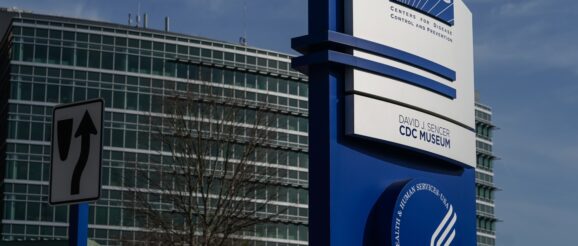Goats and Soda

As of April 1, the Centers for Disease Control and Prevention has shut down its Maternal and Child Health Branch, which works with other countries to ensure that mothers and children at risk of or infected by HIV receive treatment. All 22 staff were terminated.
That’s one of the ways that global health will be affected by the 25% reduction in staff and 35% reduction in contracts for the agency – ordered on April 1 by Secretary of Health and Human Services Robert F. Kennedy Jr. as part of an effort to “reduce bureaucratic sprawl.”

Although CDC has a sweeping domestic agenda, it also focuses on worldwide issues through its Global Health Center, which has about 550 employees.
As part of the restructuring, the director of the center Kayla Maserson was one of several CDC directors transferred to the Indian Health Service, leaving the Global Health Center in the hands of deputies.
What was cut?
The third division, Global HIV and TB, however, had seven of its 15 branches eliminated, terminating all of their staff and leadership.
Two scientists who worked at Maternal and Child Health said the branch was “providing HIV treatment for over 300,000 children, and we provided treatment for over 380,000 HIV positive pregnant and breastfeeding women in 2024.”
Those employees have been one of several federal teams — including from the State Department and the now dismantled USAID — that were critical in carrying out the programs of PEPFAR – a widely hailed government initiative to control HIV, started by President George W. Bush in 2003, that the State Department credits with saving 25 million lives since its inception.
Assessing the impact
One of the scientists with the Maternal and Child Health team said the cuts were a major blow personally and professionally.
“My colleagues at the branch and I have really dedicated our careers to ensuring that mothers and babies receive the HIV services they need, and we serve as advocates for children to get the services they need so that they can be healthy and stay alive,” the scientist said. “I personally am just worried that no one will be advocating for these populations that are often overlooked anymore, and that that puts them more at risk for dying.”
One epidemiologist who was not affected by these cuts said even though this was a global health program, its elimination could have a direct impact on the lives of Americans.
“HIV knows no boundaries. If we see a resurgence of HIV globally. It’s going to have long term consequences everywhere, with what we know about mutations of HIV, resistance to drugs, transmission rates. It’s just going to be detrimental. It’s going to harm economies around the world,” the epidemiologist said.
The U.S. has played a major role in global health and helped save millions of lives around the world with its support for global immunization efforts and HIV/AIDs treatments, says Janeen Madan Keller, the deputy director of the global health policy program at the Center for Global Development, a Washington, D.C., think tank.
“I think one of the challenges that we’re really confronting is that these sweeping and uecedented actions that are being taken by the current administration are coming at a time when many other governments are also cutting their foreign aid budgets for many different reasons.”
“I don’t think we have an answer.”
